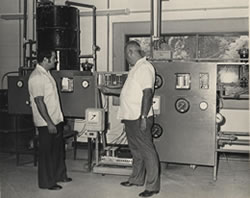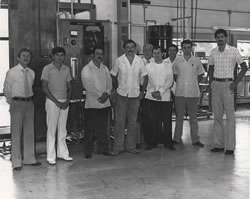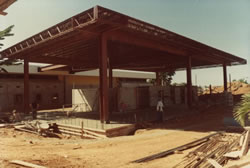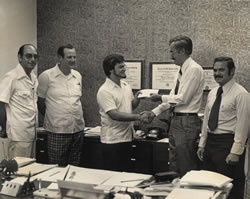By Lourdes Fábregas Laracuente (Translated by Magda Latorre-Esteves)
On September 2011, the Mayagüez Campus of the University of Puerto Rico (better known as Recinto Universitario de Mayagüez, or “Colegio”) commemorated one hundred years of scholarly excellence. The University’s Department of Chemical Engineering, which is approaching ninety years of academic distinction, has been instrumental to this century of excellence.
While going through our archives, we found that the first Sugar Industry Engineer graduated from this campus in 1918. This title was a reflection of the industry that stirred the island’s economy and growth. A few of the courses offered at that time wereOrganic Chemistry, Heat Engineering, Sugar Manufacture, Sugar Analysis, Physical Chemistry, Chemical Engineering I, Sugar House Practice, Sugar House Calculation, Sugar House Machinery, Industrial Organic Chemistry, Hydraulics, and Sugar Cane Production. This specialized engineering program eventually gave rise to the Chemical Engineering Program.
In 1925, the program’s first two students arrived, obtaining their bachelor’s degree in 1930. The first female graduated from the Engineering Faculty in 1955, and two years later, in 1957 the first female completed her bachelor’s degree from the Chemical Engineering Department. Currently, almost 70% of students entering and graduating from the Chemical Engineering Program are female.
Between 1958 and 1970, the Chemical Industry represented the biggest sector of economic growth in Puerto Rico. The most striking area of development corresponded to the Petrochemical Industry, which invested $500 million during this period. Today, this would amount to an investment of more than $2.5 billion.
The arrival of Dr. Rafael Muñoz Candelario in 1959 marked the beginning of a new era in the Chemical Engineering Department. He is hailed as the father of modern Chemical Engineering in Puerto Rico. He is responsible for initiating a transformation in the Department’s academic agenda that allowed specialists in this field to adjust to the technical demands of a rapidly growing and ever-changing industry.
 By the 1961-1962 academic year, the Chemical Engineering institution policy had changed, from requiring three years of basic and two years of specialized instruction to requiring two years of basic and three years of specialized education. During this period, a more refined and modern curriculum was implemented. This new curriculum included required courses, such as two Thermodynamic courses specifically applied to Chemical Engineering problems, a Transport Phenomena course oriented to fluid mechanics, two Process Plant Design courses, a Kinetics and Catalysis course, a Seminar, and a course titled “Advances in Chemical Engineering”.
By the 1961-1962 academic year, the Chemical Engineering institution policy had changed, from requiring three years of basic and two years of specialized instruction to requiring two years of basic and three years of specialized education. During this period, a more refined and modern curriculum was implemented. This new curriculum included required courses, such as two Thermodynamic courses specifically applied to Chemical Engineering problems, a Transport Phenomena course oriented to fluid mechanics, two Process Plant Design courses, a Kinetics and Catalysis course, a Seminar, and a course titled “Advances in Chemical Engineering”.
The traditional emphasis given to Sugar Industry technology was replaced by an intense training in the areas of chemistry, physics, mathematics, and engineering principles that were common to all chemical operations at the industrial scale. Interest in studying Chemical Engineering grew dramatically. Enrollment between 1960 and 1975 grew 500%. This growth compelled the development of a more numerous and qualified faculty as well as the improvement of physical facilities.
The Chemical Engineering profession came to occupy a position of great prominence in the Puerto Rican community, turning it into a symbol of technical excellence and reliability. It was considered the backbone of the island’s industrial economy. Evidence of this is the fact that the local petroleum industry joined resources to bestow upon the Department a generous donation of $100,000 a year for five years for its growth and improvement. The effort of Dr. Rafael Muñoz Candelario was instrumental in this great achievement. This contribution would amount to more than $2.5 million today.
 The continuous improvement and development of the Chemical Engineering Department and its undergraduate curriculum resulted in the accreditation of the program in October of 1970 by the Engineering Council for Professional Development. The Merck Sharp and Dohme lecture series started shortly after in 1972, and has been offered without interruption for the past 39 years.
The continuous improvement and development of the Chemical Engineering Department and its undergraduate curriculum resulted in the accreditation of the program in October of 1970 by the Engineering Council for Professional Development. The Merck Sharp and Dohme lecture series started shortly after in 1972, and has been offered without interruption for the past 39 years.
Due to the increase in complexity and diversity of the Puerto Rican chemical industry, a group of professors led by Dr. Rafael Muñoz Candelario and Dr. Raúl Chao, then Department Director of Chemical Engineering, began the groundwork for the establishment of a Graduate Program in Chemical Engineering. Their efforts succeeded when in May 19th, 1972, the Master’s in Science in Chemical Engineering and Master’s in Engineering were finally approved. The first student to obtain a Masters in Science in Chemical Engineering from this new Program graduated two years later.
At that time, the Department Office and classrooms were located in the Stefani building and the laboratories were located in the Luchetti building. These facilities were no longer sufficient to meet the needs of the rapidly expanding department, a growth caused by the rapid development of the petrochemical industry and the impact of the Chemical Engineering Profession over the Puerto Rican Economy. In 1979, the new Chemical Engineering Building in the Engineering Complex, better known locally as “Las Malangas” was completed. This project was completed thanks to the joint effort, collaboration, and generous economic contributions of the petrochemical industry and the Department of Chemical Engineering. Various expansions were made to these facilities in 1984, 1986, and 1998, driven by the establishment of solid Manufacturing and Pharmaceutical Industries in Puerto Rico, and the evolution of the Department’s Undergraduate and Graduate Programs.
 Since 1980, Puerto Rico has been going through a phase of industrial development, which has brought with it manufacturing processes characterized by a high degree of technical sophistication. The best examples of this are the extraordinary boom in the Pharmaceutical and Biotechnology Industries experimented in the Island. This required the training of a professional technical workforce equipped to solve the complex problems that frequently arise in this type of specialized industry. For the first time in our history, the need for a knowledge-based economy became evident. The existing programs in the Chemical Engineering Department were not enough to satisfy these needs, a problem that encouraged the Chemical Engineering Department to establish a Graduate Program that would lead to a degree in Doctor in Philosophy in Chemical Engineering. Through effort and hard work, the Ph.D. Program in Chemical Engineering at the University of Puerto Rico at Mayagüez was established in January of the year 2000.
Since 1980, Puerto Rico has been going through a phase of industrial development, which has brought with it manufacturing processes characterized by a high degree of technical sophistication. The best examples of this are the extraordinary boom in the Pharmaceutical and Biotechnology Industries experimented in the Island. This required the training of a professional technical workforce equipped to solve the complex problems that frequently arise in this type of specialized industry. For the first time in our history, the need for a knowledge-based economy became evident. The existing programs in the Chemical Engineering Department were not enough to satisfy these needs, a problem that encouraged the Chemical Engineering Department to establish a Graduate Program that would lead to a degree in Doctor in Philosophy in Chemical Engineering. Through effort and hard work, the Ph.D. Program in Chemical Engineering at the University of Puerto Rico at Mayagüez was established in January of the year 2000.
To date, the Chemical Engineering Department has granted 3,746 Bachelor’s in Science degrees, 191 Master’s Degrees and 29 Ph.D.’s. During the past ten years, around 100 students have obtained their Bachelor’s Degree annually, a statistic that makes the Department of Chemical Engineering at the Mayagüez Campus of the University of Puerto Rico the largest producer of Hispanic and Hispanic Female Chemical Engineers in the United States. This position has been achieved thanks to the development, growth, and evolution of the Chemical Engineering Profession in its tradition of nearly ninety years of institutional excellence, forged by students, alumni and Professors of the Chemical Engineering Department.
 We ask all of our alumni to contribute economically to the development of this Department; these donations will be used as seed money for the construction of Phase V of the Chemical Engineering Building. The advancement of the Profession and the Industry at a global level has required that the Department be in continuous development to satisfy these needs. The unconditional support, economic contributions, and involvement of the local Industry is necessary to guarantee this development; only then can we guide our Chemical Engineers to face the new challenges posed by emergent technologies.
We ask all of our alumni to contribute economically to the development of this Department; these donations will be used as seed money for the construction of Phase V of the Chemical Engineering Building. The advancement of the Profession and the Industry at a global level has required that the Department be in continuous development to satisfy these needs. The unconditional support, economic contributions, and involvement of the local Industry is necessary to guarantee this development; only then can we guide our Chemical Engineers to face the new challenges posed by emergent technologies.
The Chemical Engineering Department is committed to training and producing the best Chemical Engineers in the country and in the world. In addition to our alumni, the local industry should be committed to promoting, helping, and collaborating with the Department to allocate funds for the advancement of research and infrastructure. It is only through joint effort that Puerto Rico’s industries can count on an exceptionally skilled workforce trained in the finest Chemical Engineering School in the Spanish-speaking world.
